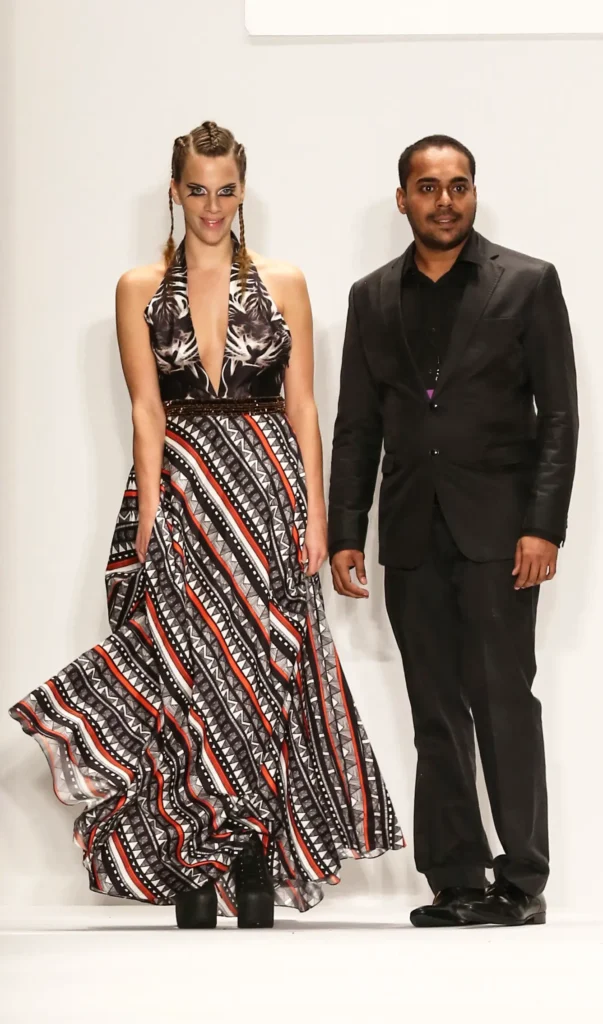
About Shrekahnth
Shrekahnth is a sustainable luxury fashion brand. It was founded in 2009 in Dubai, UAE. The brand blends modern innovation with traditional crafts. Srikanth Yeddula, the founder and creative director, developed it as his eponymous brand. He is a Fashion Entrepreneur and a Textile & Fashion designer. Srikanth studied Fashion and Information Technology at the National Institute of Fashion Technology in Hyderabad, India, from 2002 to 2006. The brand showcased seasonal collections at Dubai and New York Fashion Weeks. It received praise for its creative prints and womens wear fits in the Middle East. The collections were displayed in top showrooms in Paris and Berlin. The showcases helped the brand to sell in Middle Eastern fashion stores and departmental stores.
Shrekahnth is deeply committed to Sustainability, Design Innovation, and Heritage Preservation. This commitment keeps pushing the limits of sustainable fashion. Shrekahnth, as a brand, wants to create fair partnerships with Indigenous Traditional Crafts in India and West Africa for producing collections. This includes countries like Ghana, Benin, and Nigeria. Shrekahnth creates eco-friendly luxury apparel in Modern designs that support craft preservation and benefit artisans and their communities.
Bespoke Magazine - Written By Mariam Mosalli
Beginning with his eponymous debut in spring/summer 2010, Dubai-based fashion designer and Print-maker, Shrekahnth triggered a new wave of digital artwork into the Middle Eastern fashion scene. From collections based on the architecture of Dubai to the travels of 14th century Moroccan Muslim scholar and traveller, Ibn Battuta, Shrekahnth’s work turns a traditional aesthetic on its head, via the Neo-contemporary medium of hyper-real prints. His references may be many, but it is his unparalleled ability to utilise special cuts in order to flatter the female figure that has made him quite successful with the Arab, or Pro-Arab clientele, earning him the title of "The Kaftan King". His references to Islamic Art beautifully translate into Fashion-forward Prêt-à-Porter.

"Centuries-old traditional crafts transform into Sustainable Luxury"
FAQ
ask us
anything
Why are we a Sustainable Fashion Brand ?
Environmental Responsibility
Environmental responsibility is the core value of the brand. Many of the ecological problems we now address directly simulate the fashion business. These environmental issues need fast solutions. This includes manufacturing clothing, releasing greenhouse gases, polluting water with toxic dyes, and creating textile waste.
- Textile Waste: Every year, millions of high-fashion items are thrown away. They fill landfills and beaches, causing pollution to rise.
- Resource Depletion: Earth has limited resources. Using non-renewable materials for synthetic fibers strains these resources. Also, growing cotton requires a lot of water.
- Chemical Pollution: Conventional dyeing methods kill aquatic life and pollute drinking water. They release toxic chemicals into water bodies.
- Carbon Emissions: Making textiles, dyeing them, and burning clothing waste add more greenhouse gases to the air. The apparel industry contributes enormously to global carbon emissions, aggravating climate change.
Ethical Practices
At Shrekahnth, ethical practices are at the heart of everything we do. Fashion should not come at the expense of human dignity or well-being. The global fashion industry has big problems with unethical manufacturing and sourcing. This can cause sweatshops and serious labour issues.
The Problem with Unethical Manufacturing and Sourcing
- Sweatshops: Many fashion brands make clothes in countries with weak labour laws. They do this to save money. Sweatshops often put workers in tough conditions. They face long hours and low pay.
- Child Labor: In some areas, children work illegally in factories. This takes away their education and childhood. It also puts them in dangerous jobs.
- Exploitation: Workers may face unfair treatment. This includes no contracts, denied rights, and unsafe conditions. They often lack safety equipment and proper safety measures.
- No Transparency: If the supply chain is unclear, consumers can’t see how their clothes are made. This allows unethical practices to go on without notice.
How We Practice Sustainability?
Our commitment to sustainability is reflected in every aspect of our operations.
Circular Fashion Model
We collect clothing and textile waste from Ghana and West Africa. This is part of our commitment to sustainability. This waste is upcycled by breaking the garments into panels for new designs. It can also be recycled into fibers to make new textiles. This approach reduces landfill waste and gives new life to materials.
Ethical Sourcing and Production
- Recycled Textiles: We make recycled cotton yarn from used clothes and textile waste. We ethically manage and process high-quality recycled yarns. They are the foundation of our new collections.
- Natural Dyes and Yarns: We use natural yarns, such as cotton, silk, and linen. Sometimes, we blend these with recycled yarns. These yarns use natural, plant-based dyes from India and West Africa. This promotes eco-friendly dyeing.
- Handwoven Textiles: We get our dyed yarns Handwoven from Madhavaram. It’s a village in Kadapa District, Andhra Pradesh, South of India. This handloom cluster is around the village with 4,000 weavers. They create beautiful fabrics for our collections. Partnering with this community helps us support traditional weaving. We also provide sustainable livelihoods by diversifying our products for international markets.
Technological Integration
- Blockchain Transparency: We tag and log every supply chain step on the blockchain. This technology brings transparency and traceability. It lets consumers check the authenticity and sustainability of our products.
- Digital Innovation: We design and produce style variants and 3D art digital assets. Since 2009, we have archived our best-selling prints as NFT art. We keep evolving with new collections. We’re building a digital world of lifestyle products. These items mix fashion with technology.
Quality and Social Compliance
- Environmental Compliance: We rigorously audit our supply chain to ensure ecological sustainability.
- Social Compliance: We support fair wages in our supply chain. This ensures that our products are made ethically.

